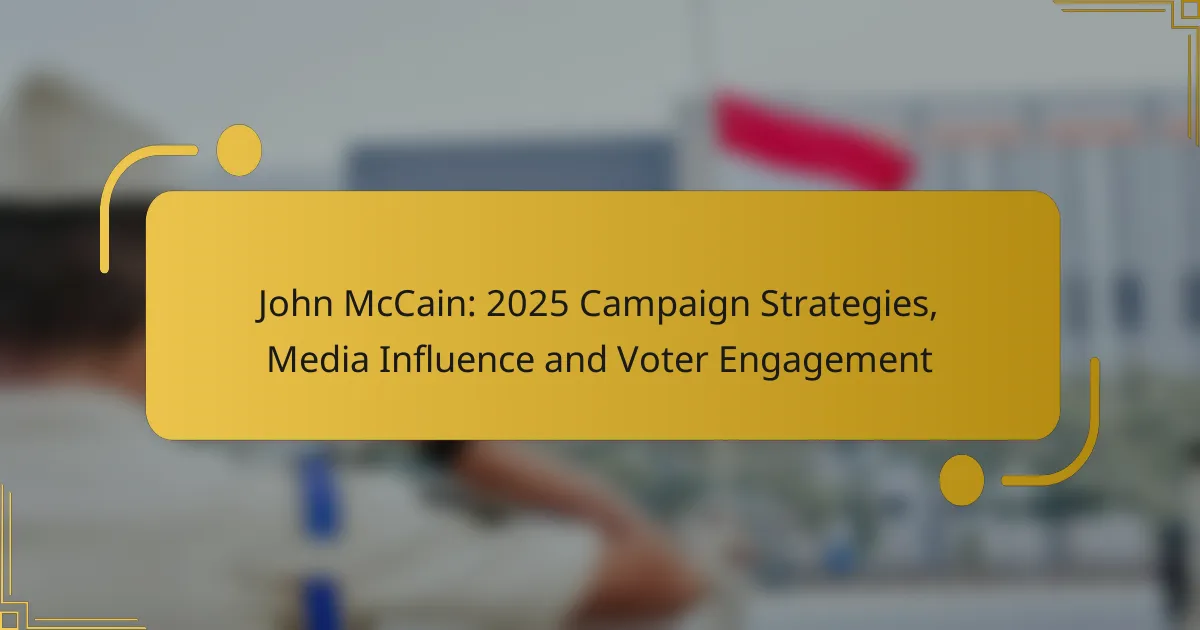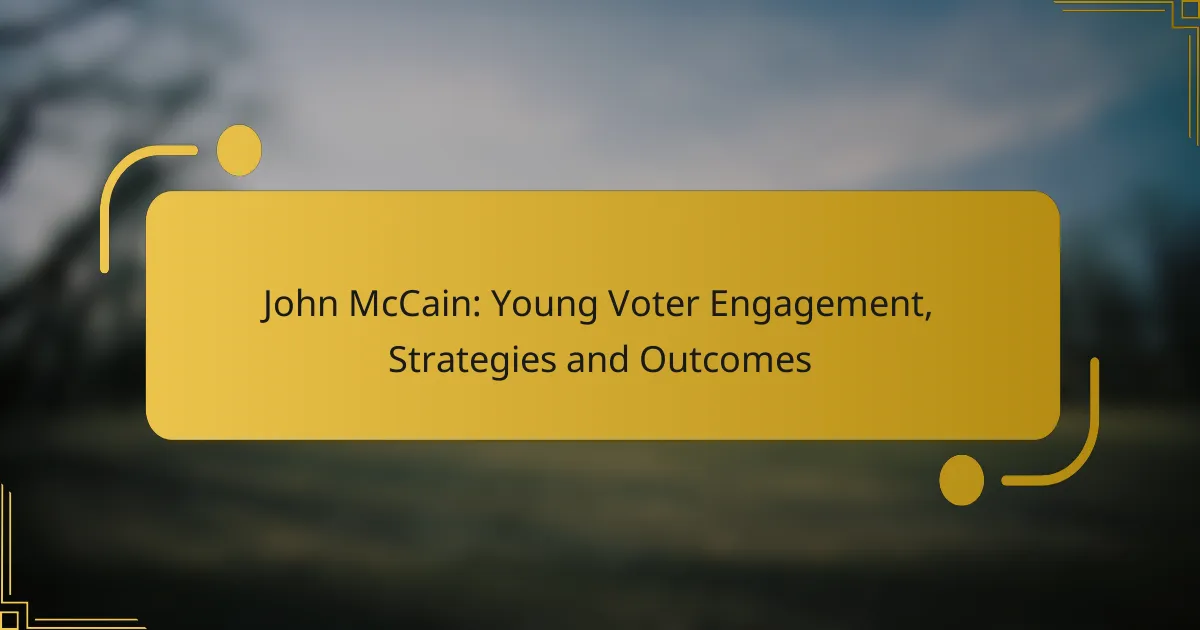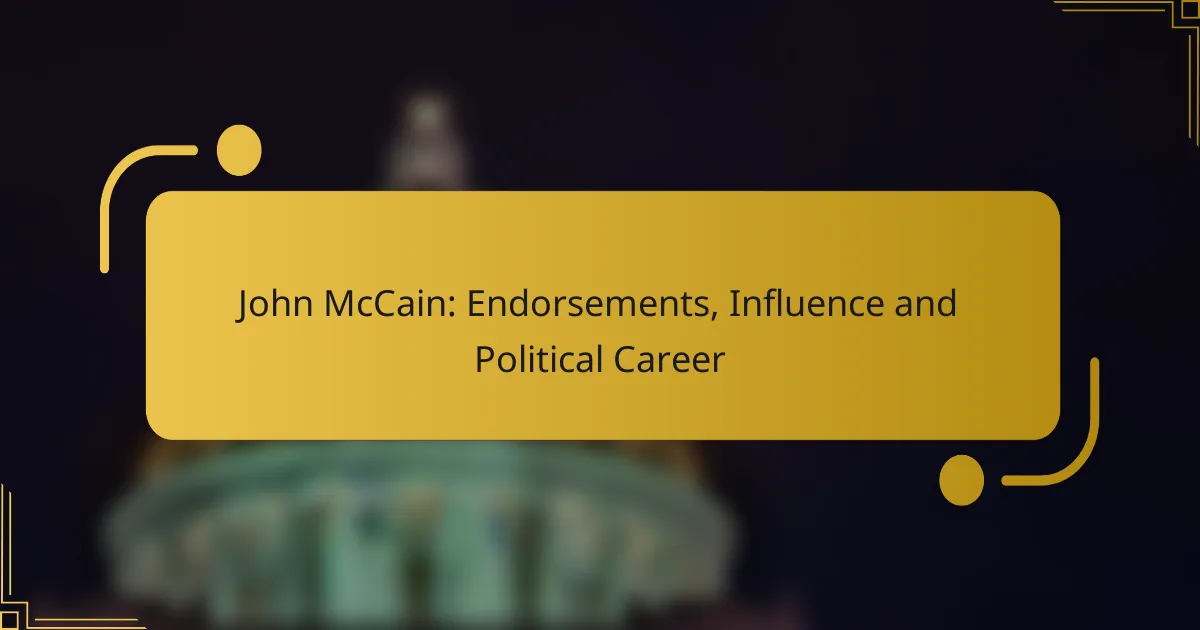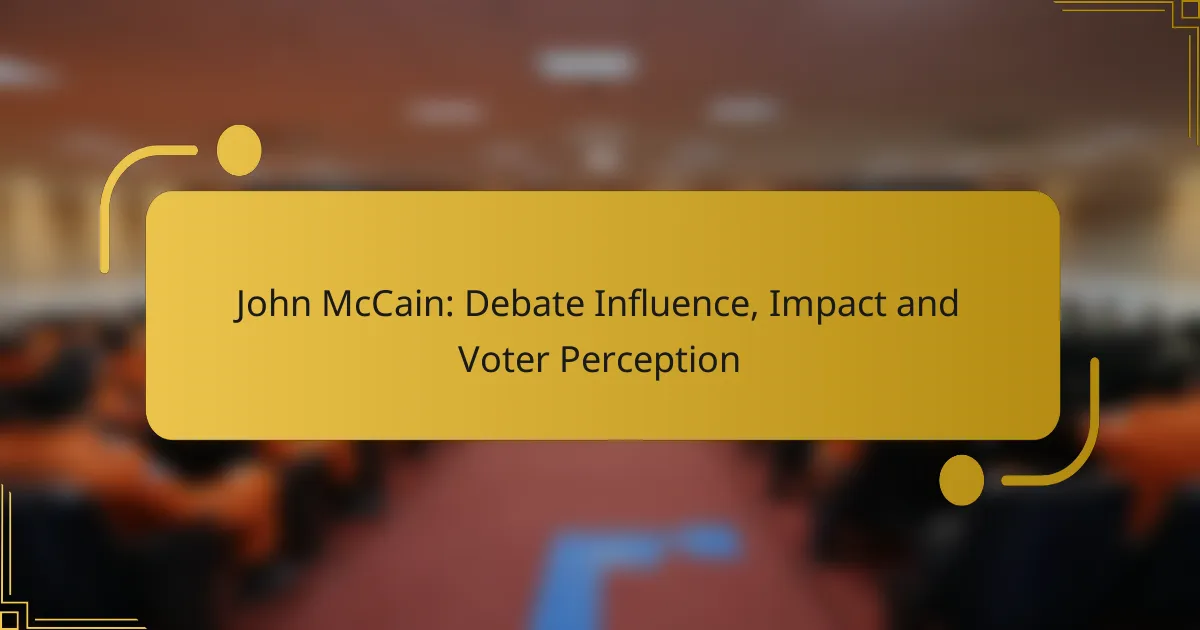John McCain’s 2025 campaign strategies emphasize building a broad coalition of support through modern communication tools and community involvement. By leveraging effective media strategies, the campaign aims to shape public perception and enhance voter engagement. Additionally, a variety of voter engagement tactics will be employed to connect with constituents and encourage active participation in the electoral process.
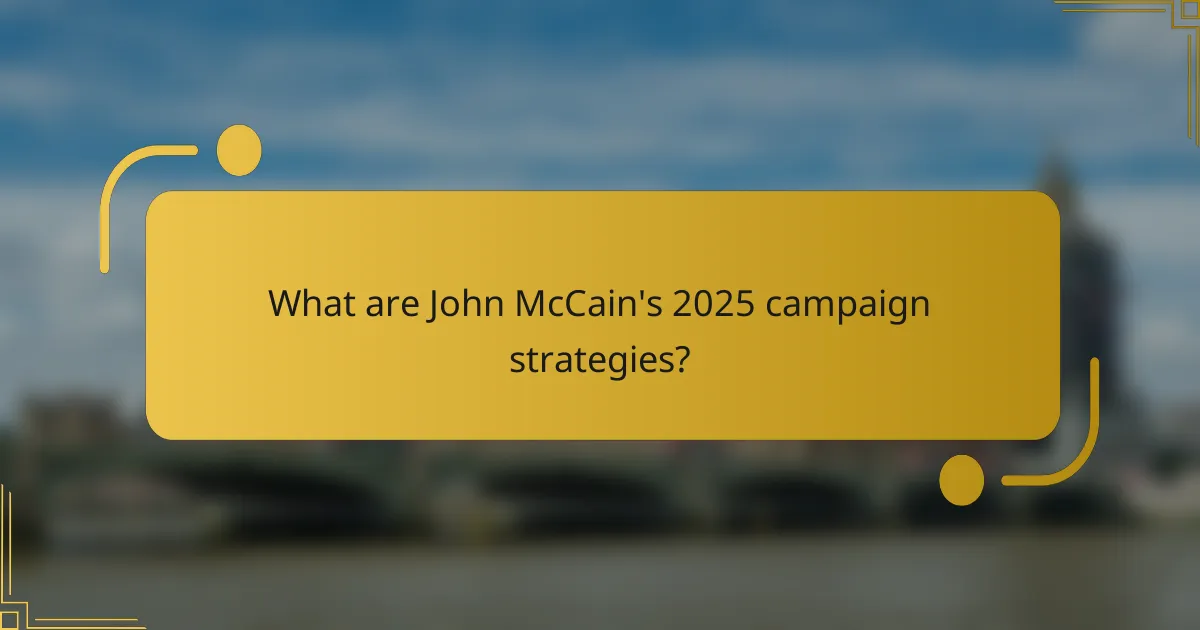
What are John McCain’s 2025 campaign strategies?
John McCain’s 2025 campaign strategies focus on building a broad coalition of support, leveraging modern communication tools, and fostering community involvement. These approaches aim to resonate with a diverse electorate while maximizing outreach and engagement.
Focus on bipartisan appeal
To attract a wide range of voters, McCain’s campaign will emphasize bipartisan appeal by addressing issues that transcend party lines. This includes advocating for policies that benefit both conservative and liberal constituents, such as healthcare reform and infrastructure improvements.
Engaging with leaders from both parties can enhance credibility and demonstrate a commitment to collaboration. By showcasing successful bipartisan initiatives, the campaign can build trust and attract undecided voters.
Utilize digital platforms for outreach
Digital platforms will play a crucial role in McCain’s 2025 campaign strategies. Utilizing social media, email newsletters, and targeted online advertising can effectively reach younger voters and those who prefer digital communication. Campaigns should focus on creating engaging content that encourages sharing and interaction.
Additionally, data analytics can help identify key demographics and tailor messages accordingly. Regularly updating content and responding to follower inquiries can foster a sense of community and increase voter engagement.
Engage with grassroots movements
Grassroots movements are vital for building local support and mobilizing volunteers. McCain’s campaign should actively collaborate with community organizations and local leaders to understand the specific needs and concerns of constituents. This can help tailor campaign messages and initiatives to resonate more deeply with voters.
Hosting town halls, community events, and volunteer training sessions can empower supporters and create a strong network of advocates. Encouraging grassroots fundraising efforts can also supplement traditional campaign financing and increase local investment in the campaign’s success.
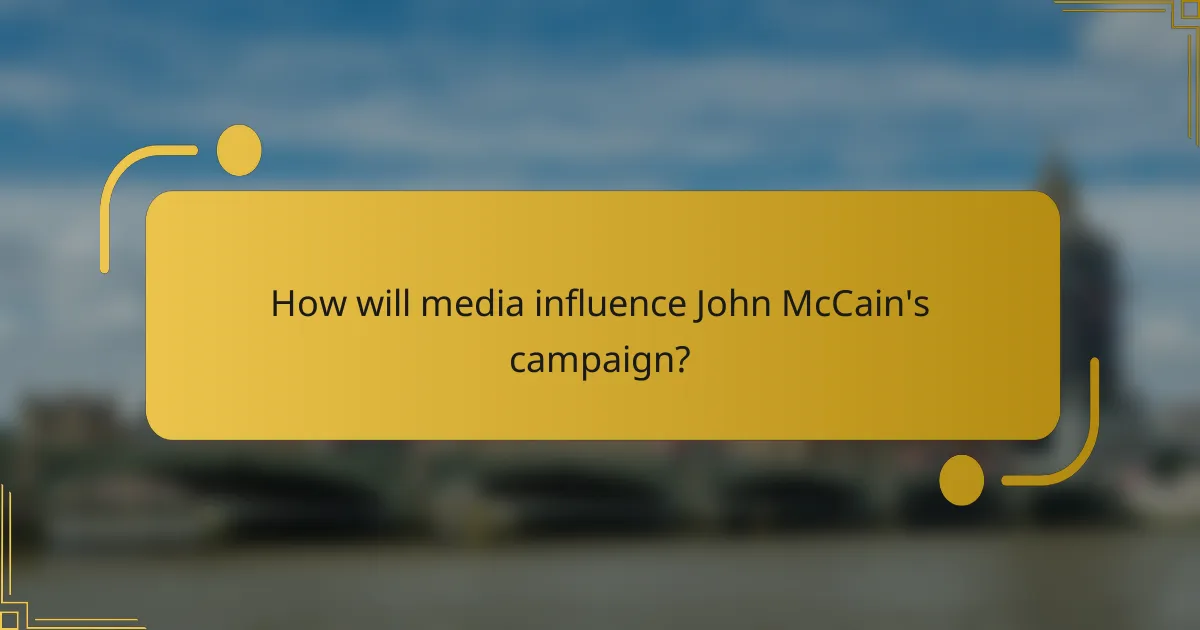
How will media influence John McCain’s campaign?
Media will play a crucial role in shaping John McCain’s campaign by affecting public perception and voter engagement. Effective media strategies can amplify his message and reach diverse audiences, making it essential to understand how to navigate this landscape.
Leveraging social media for messaging
Social media platforms are vital for delivering campaign messages directly to voters. By utilizing channels like Twitter, Facebook, and Instagram, McCain can engage with constituents in real-time, share updates, and respond to concerns. This direct interaction fosters a sense of community and transparency.
To maximize impact, McCain’s campaign should focus on creating shareable content that resonates with target demographics. This includes using visuals, videos, and infographics that highlight key issues and achievements. Regularly analyzing engagement metrics can help refine strategies and improve outreach.
Building relationships with key journalists
Establishing strong connections with influential journalists can enhance media coverage and shape narratives around McCain’s campaign. By proactively engaging with reporters, the campaign can ensure accurate representation of its positions and counter any negative press effectively.
To build these relationships, McCain’s team should offer exclusive interviews, timely press releases, and access to campaign events. Regular communication and transparency can foster trust, making journalists more likely to cover the campaign favorably. It’s crucial to identify and prioritize journalists who cover relevant political topics and have a significant following.

What voter engagement tactics will be used?
The 2025 campaign will utilize various voter engagement tactics to connect with constituents and encourage participation. These strategies will focus on direct interaction, leveraging both in-person and digital platforms to foster community involvement and feedback.
Community town halls in Arizona
Community town halls will serve as a cornerstone for voter engagement in Arizona. These events will allow constituents to voice their concerns, ask questions, and engage directly with campaign representatives. Organizers should aim for a mix of locations, including urban centers and rural areas, to ensure broad accessibility.
To maximize participation, consider scheduling town halls during evenings or weekends when more people are available. Promoting these events through local media, social platforms, and community organizations can help reach a wider audience.
Interactive online forums
Interactive online forums will provide a platform for voters to engage with the campaign from the comfort of their homes. These forums can include live Q&A sessions, discussion boards, and surveys to gather feedback on key issues. Utilizing popular social media channels can enhance visibility and participation.
To ensure these online forums are effective, set clear guidelines for participation and moderation. Regularly updating content and responding to participant inquiries can foster a sense of community and encourage ongoing dialogue. Aim to host these forums at various times to accommodate different schedules and time zones.
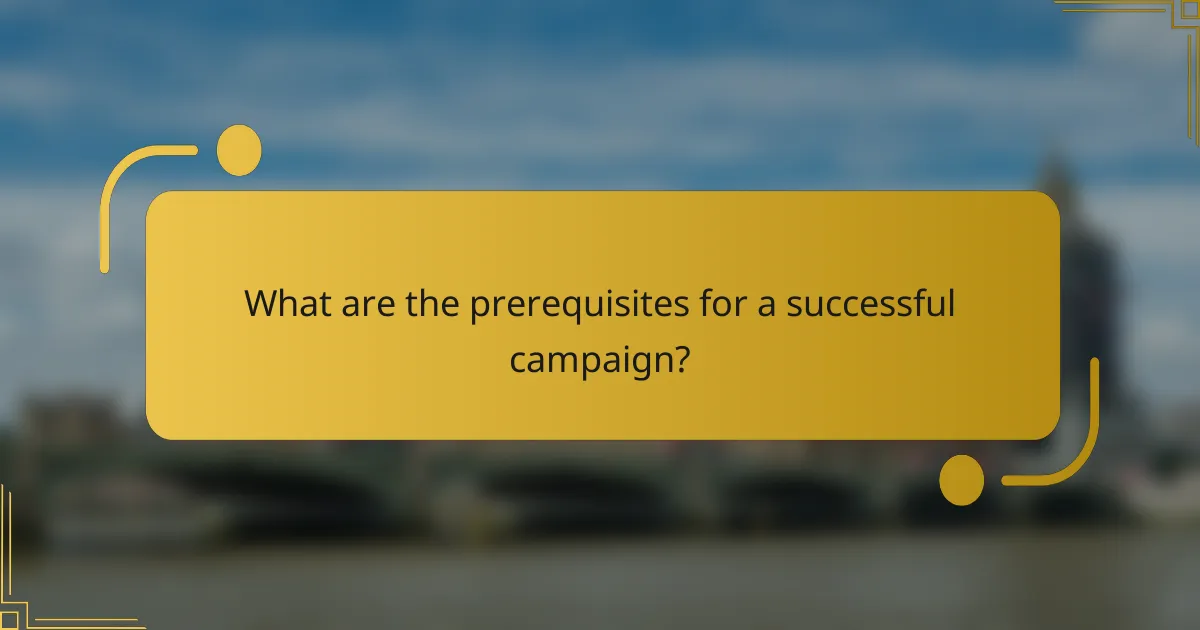
What are the prerequisites for a successful campaign?
A successful campaign requires a clear strategy, understanding of voter needs, and a dedicated team. Key elements include effective communication, thorough research on demographics, and the ability to adapt to changing political landscapes.
Understanding voter demographics
Grasping voter demographics is essential for tailoring campaign messages and outreach efforts. This involves analyzing factors such as age, income, education, and geographic location to identify key voter segments.
For example, younger voters may prioritize issues like climate change, while older demographics might focus on healthcare. Campaigns should utilize surveys and data analytics to refine their understanding of these groups.
Establishing a strong campaign team
A strong campaign team is vital for executing strategies effectively. This team should include individuals skilled in communications, fundraising, and grassroots organizing, each playing a crucial role in the campaign’s success.
Recruiting volunteers and engaging local leaders can enhance outreach efforts. Regular training sessions and clear communication channels within the team help maintain focus and adaptability as the campaign progresses.
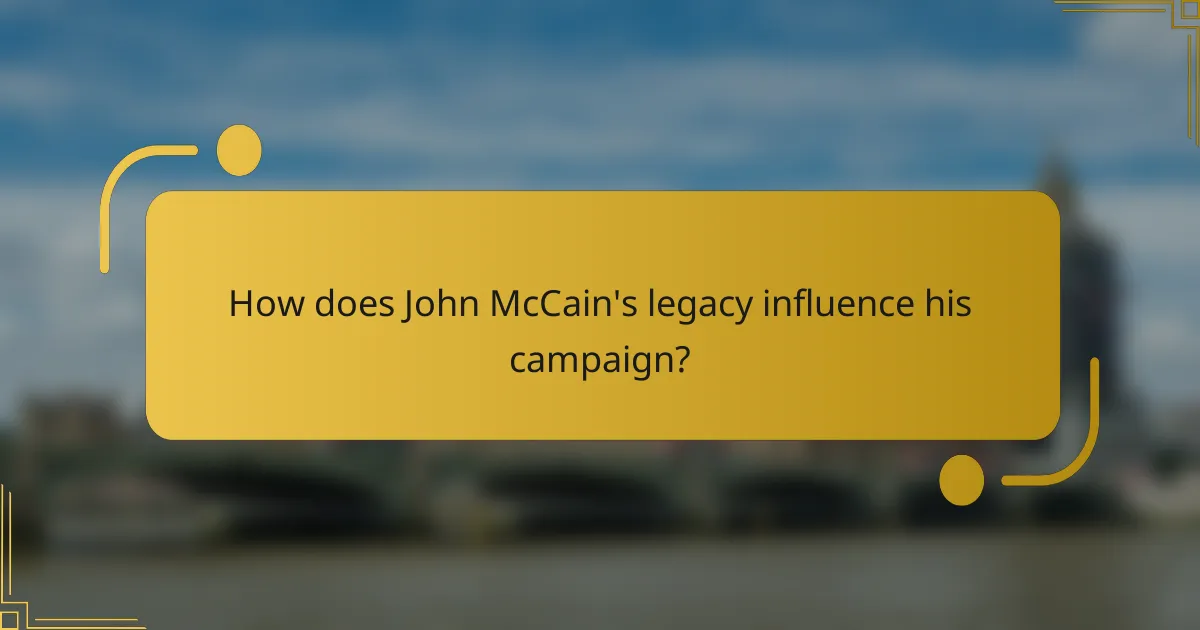
How does John McCain’s legacy influence his campaign?
John McCain’s legacy significantly shapes his campaign by emphasizing values such as patriotism, integrity, and bipartisanship. His history as a military veteran and a long-serving senator resonates with voters who prioritize strong leadership and commitment to national service.
Emphasis on military service
McCain’s military service is a cornerstone of his campaign strategy, appealing to voters who respect dedication to the country. His experiences as a prisoner of war and a naval aviator highlight resilience and sacrifice, traits that many constituents admire.
To leverage this legacy, the campaign can incorporate storytelling that showcases McCain’s military background in speeches and advertisements. This approach not only honors his past but also connects with voters who value defense and national security.
Advocacy for veterans’ issues
Advocating for veterans’ issues is another critical aspect of McCain’s campaign, reflecting his commitment to those who have served. By focusing on improving healthcare, job opportunities, and mental health services for veterans, the campaign can resonate with a significant voter demographic.
Practical steps include proposing specific policies that address veterans’ needs, such as increasing funding for the Veterans Affairs Department or enhancing educational benefits. Engaging with veteran organizations and hosting town halls can further strengthen this connection and demonstrate genuine support for the veteran community.

What are the emerging trends in political campaigning?
Emerging trends in political campaigning are significantly reshaping how candidates engage with voters. Key developments include the integration of advanced technologies and innovative strategies that enhance voter outreach and participation.
Increased use of AI in voter targeting
The use of artificial intelligence (AI) in voter targeting allows campaigns to analyze vast amounts of data to identify and engage specific voter demographics effectively. By leveraging machine learning algorithms, campaigns can predict voter behavior and tailor messages that resonate with individual preferences.
For instance, AI can segment voters based on their online activity, social media interactions, and past voting patterns. This targeted approach can increase engagement rates, as messages are more relevant to the audience, leading to higher conversion rates during elections.
Rise of virtual campaigning events
Virtual campaigning events have become a staple in modern political strategies, allowing candidates to reach a broader audience without geographical constraints. These online gatherings can include live-streamed town halls, webinars, and interactive Q&A sessions, making it easier for voters to participate from the comfort of their homes.
Campaigns should consider using platforms like Zoom or social media for these events, as they facilitate real-time interaction and feedback. However, it’s crucial to ensure that the technology is user-friendly and accessible to avoid alienating less tech-savvy voters.
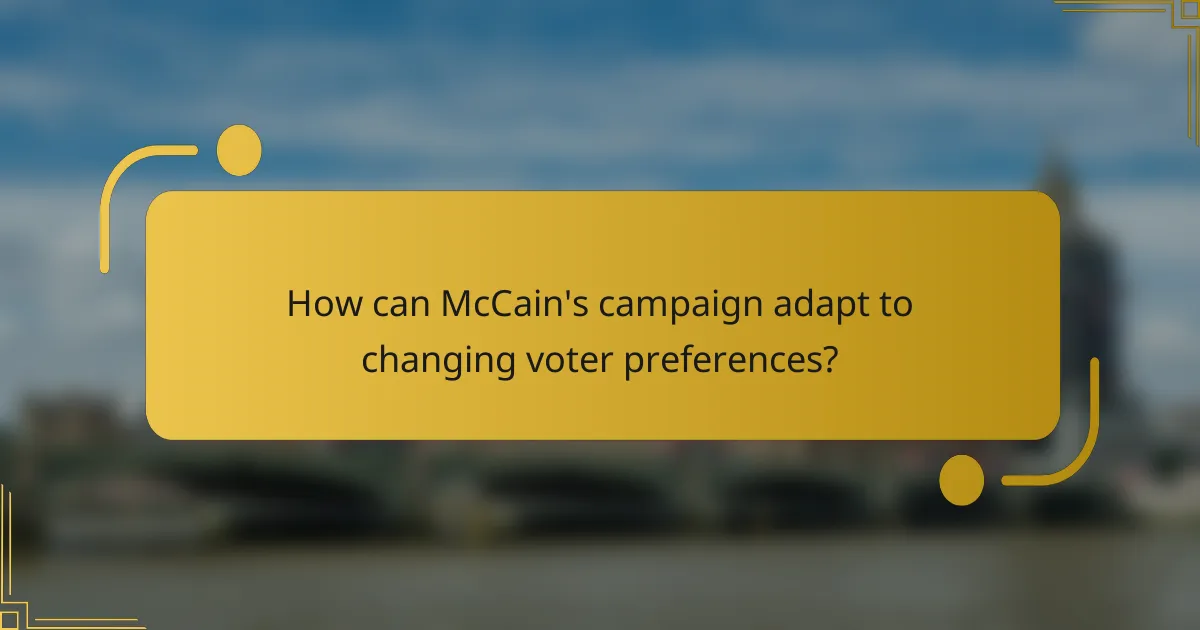
How can McCain’s campaign adapt to changing voter preferences?
McCain’s campaign can adapt to changing voter preferences by actively engaging with constituents and leveraging data-driven insights. Understanding the evolving concerns and priorities of voters will enable the campaign to tailor its strategies effectively.
Incorporating feedback from focus groups
Utilizing focus groups allows the campaign to gather direct insights from voters about their preferences and concerns. This qualitative feedback can highlight issues that resonate most with the electorate, enabling the campaign to adjust its platform accordingly.
To effectively incorporate feedback, the campaign should conduct regular focus group sessions across diverse demographics. This ensures a comprehensive understanding of varying perspectives, which can inform messaging and outreach strategies.
Adjusting messaging based on polling data
Polling data serves as a critical tool for understanding voter sentiment and adjusting campaign messaging. By analyzing trends in polling results, the campaign can identify which issues are gaining traction and which are losing relevance among voters.
To maximize effectiveness, the campaign should track polling data frequently and be prepared to pivot messaging as needed. For instance, if polls indicate a growing concern about healthcare, the campaign should emphasize its healthcare policies in communications and outreach efforts.
